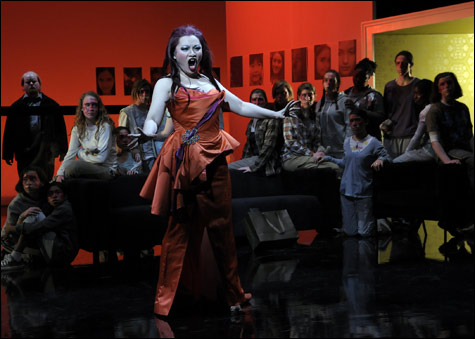
MOVIE-STAR BEAUTY Chinese soprano Ying Huang’s refined, well-focused voice seemed tireless, but she didn’t give Madame White Snake much else by way of character. |
"I can no longer stand to let this travesty continue," sings a character in Madame White Snake, the new opera based on an ancient Chinese legend co-commissioned by Opera Boston, which has just presented its world premiere. I'm afraid I shared the sentiment at last Friday's performance. The inspiration for this project came from first-time librettist Cerise Lim Jacobs, a retired lawyer and federal prosecutor born in Singapore who specialized in creative writing at the University of Pittsburgh. Her libretto began as a love poem to her husband. The couple aroused the interest of Opera Boston and the Chinese-American community, and they contributed some $200,000 of their own money to mount an opera. Unfortunately, the story bogs down in a clumsy amalgam of banalities, from the flat "How are you?" (the one line that actually got a laugh) to a series of pedestrian homilies reaching for oracular insight ("Is it ever possible to fully know one another?"; "Love belongs not in your mind but in your heart"; "More time — mere mortals moan for more time"). Stilted abstractions ("vulnerability," "intensity," "supremacy," "humanness") deny characters a distinctive or believable voice. And they're hard to sing.
This is also the first opera by the distinguished Chinese-born composer Zhou Long, who survived the Cultural Revolution and is now a professor at the University of Missouri–Kansas City. His score is colorful, even ecstatic, but it doesn't escape banality either. Zhou uses a Western orchestra with Chinese percussion and three Chinese instruments — clay and bamboo flutes and the two-stringed erhu. The idiom is all too familiar, though skillfully orchestrated. For the title character — the snake demon who, like Keats's Lamia, falls disastrously in love with a human — he uses slithery "bent" musical lines and extreme high notes. But other characters also have these bent lines, so the musical characterization seems insufficient. And despite the impressive playing of the orchestra under Gil Rose, the score lacks a compelling dramatic shape. The most memorable moments are the choruses for the spirits of drowned children (the accomplished Boston Children's Chorus), settings of Chinese poems Zhou himself translated and had already composed before he became involved with this opera.
The production, directed by Robert Woodruff, former artistic director of ART, is breathtakingly misguided. The story is a nature myth, and the opera's four intermissionless acts represent the seasons: spring (falling in love), summer (consummation), autumn (doubt), winter (betrayal). Woodruff, attempting to "universalize," resisted any impulse to suggest China. (What's wrong with suggesting China in a Chinese legend?) And instead of conveying nature, the set (David Zinn) looks like an art gallery, with confining white walls hung with black-and-white portraits and Dan Flavin–like neon lighting above and below. This turns into a modern high-rise apartment, with picture windows (getting washed), a long black couch, and (so help me) a bathtub (with a flash of posterior nudity — Opera Boston isn't saying whose): urban images more appropriate for Company or Sunday in the Park with George. "My village is your village," Madame White sings to her lover, but in what Chinese village do girls wear nothing but evening gowns? And Peter Nigrini's fluid video projections only underlined Woodruff's static stage pictures, which rarely responded to the music or helped create or explore character.